| Srl | Item |
| 1 |
ID:
150833
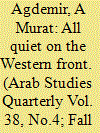

|
|
|
|
|
| Summary/Abstract |
The March 17, 2015 parliamentary elections were held roughly two years after the previous elections. According to the results, the incumbent Prime Minister Benjamin Netanyahu has formed the new government. It controls 61 parliamentary seats, and is a narrow, right-wing and ultra-Orthodox government with the narrowest of Knesset majorities. Its composition shows that it would be one of the most right-wing administrations in Israel's history, and there is hardly a mention or plan of resolving the Palestinian conflict. This article tries to analyze whether the electoral results open up new possibilities for the peace process and Israel's security agenda.
|
|
|
|
|
|
|
|
|
|
|
|
|
|
|
|
| 2 |
ID:
106019
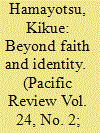

|
|
|
|
|
| Publication |
2011.
|
| Summary/Abstract |
There is a prevailing assumption amongst scholars and observers of Indonesian politics that there is a close link between religious identity and political identity. How valid is this socio-cultural identity model in explaining the party affiliation and political allegiance of increasingly pious Muslim youth to a political organization in the context of democratic consolidation? In particular, how valid is this assumption with consideration to contemporary Indonesian politics? This article engages this debate through a careful analysis of the member recruitment and mobilization of the most successful religious-based Islamist organization in post-authoritarian Indonesia, the Prosperous Justice Party (PKS). The article combines two strands of social movement theory, resource mobilization and opportunity structures, to argue that the PKS's relative success in recruiting committed Muslim youth is explained by two interrelated factors: (1) merit-based cadre recruitment and promotion, which offers young, ambitious and religiously conscious Muslim youth fair and institutionalized political career opportunities and thus incentives to commit themselves to the party's collective interests; and (2) the timing of organizational expansion that coincided with a rapid increase of state office - both executive and legislative - at the sub-national levels as a result of localized democratic elections.
|
|
|
|
|
|
|
|
|
|
|
|
|
|
|
|
| 3 |
ID:
113241
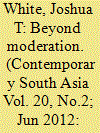

|
|
|
|
|
| Publication |
2012.
|
| Summary/Abstract |
Concerned with a rising tide of religious radicalism within Pakistan, many observers have wondered why moderates do not speak out against militancy. This article explores that question, arguing that the term 'moderate' as used in Pakistan has conflicting meanings and is both more complicated and less useful as a tool of analysis than it once seemed. In particular, the inadequacy of extant definitions is best reflected in the reassertion of a radical Sunni Barelvi subculture and in the growing rift between some leading Islamist parties and the Pakistani Taliban. This article argues in conclusion that ideological factors are typically given undue weight in explaining why and when Pakistanis choose to 'speak out' against militancy and that a narrow, minimalist rendering of 'moderate' provides the most useful definition for those trying to understand the new fault lines emerging within Pakistani Islam.
|
|
|
|
|
|
|
|
|
|
|
|
|
|
|
|
| 4 |
ID:
094947
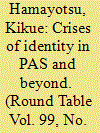

|
|
|
|
|
| Publication |
2010.
|
| Summary/Abstract |
Controversies and frictions related to Islam since the political ascendancy of the opposition coalition, Pakatan Rakyat, after the 8 March 2008 general elections have revealed multiple crises of identity not only in PAS (Islamic Party of Malaysia) and Pakatan Rakyat, but also in broader Malaysian society. It is argued that the pattern of frictions within PAS and Pakatan Rakyat has to do with the diminishing place of Muslim-Malay identity and interests in the avowedly multi-ethnic Pakatan Rakyat regime. It is suggested that these frictions are largely attributed to the distinctive character and emphasis of the Islamisation enterprises sponsored by the ruling regime under the United Malays National Organisation since the 1980s and growing Muslim anxiety and frustration about their position within the Malaysian polity.
|
|
|
|
|
|
|
|
|
|
|
|
|
|
|
|
| 5 |
ID:
122069


|
|
|
|
|
| Publication |
2013.
|
| Summary/Abstract |
Maayan Hahinuch Hatorani is a Haredi (ultra-Orthodox) educational network for elementary aged children in Israel, founded by Shas, a Sephardi ultra-Orthodox political party. The network's beginnings were in the second half of the 1980s, during the Shas' first Knesset term. It then consisted of around 30 small Talmudei Torah (Haredi elementary schools for boys), set up independently by Sephardi Haredi educational activists. This article describes their motives and activities in establishing schools for the Mizrahi community and explains the decisive contribution of two additional factors to the establishment of Maayan Hahinuch Hatorani: the senior Sephardi rabbis who awarded religious legitimacy, and the Shas Movement which provided political and financial support.
|
|
|
|
|
|
|
|
|
|
|
|
|
|
|
|
| 6 |
ID:
180066
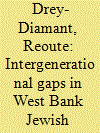

|
|
|
|
|
| Summary/Abstract |
This article examined the differences between the political attitudes of two generations of religious Zionists settlers in the West Bank. Theoretical approaches on intergenerational socialization were reviewed, predicting trends of continuity vis-à-vis change in intergenerational attitudes. Also, previous studies of the religious Zionist sector subgroups, the settlements, and their residents were reviewed. The study was conducted with a quantitative method, while the research tool was an online research questionnaire. The study findings verify the research hypothesis regarding the intergenerational differences in political attitudes, as most issues that were examined found that the younger generation holds more hawkish attitudes in comparison to their parents. Finally, the young Torani were emphasized in the research as the secondary group of settlers who, in most cases, hold the most extreme political attitudes.
|
|
|
|
|
|
|
|
|
|
|
|
|
|
|
|
| 7 |
ID:
174579
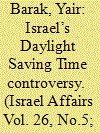

|
|
|
|
|
| Summary/Abstract |
From its establishment until 2013, the issue of Daylight Saving Time (DST) featured on Israel’s political agenda with the religious sector opposing by and large its implementation as an infringement on religious rituals and a disruption of the Hebrew-Jewish calendar and secularists presenting their struggle for DST as a fight of progress (light) against reactionary forces (dark).
|
|
|
|
|
|
|
|
|
|
|
|
|
|
|
|
| 8 |
ID:
163288
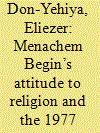

|
|
|
|
|
| Summary/Abstract |
The image of Herut as characterised by a strong linkage to Jewish religious tradition had a profound impact in the Israeli political arena. It motivated many of the religious and traditional public to support this party and later its successor, Likud. It also provided an incentive for the religious parties to join the government coalitions headed by Likud in the wake of the ‘political reversal’ of 1967. In this way, the public image of Likud as a ‘religious oriented party’ significantly contributed to the transformation of political power from Labour to Likud.
|
|
|
|
|
|
|
|
|
|
|
|
|
|
|
|
| 9 |
ID:
072229


|
|
|
| 10 |
ID:
099883
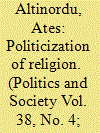

|
|
|
|
|
| Publication |
2010.
|
| Summary/Abstract |
While religious politics have been a widely discussed topic in the social sciences in recent decades, few studies develop general explanations based on systematic and detailed comparative analysis. This article seeks to explain when and how successful religious parties rise. To that end, I comparatively analyze the politicization of German Catholicism in the second half of the nineteenth century (1848-1878) and Turkish Islam in the post-1970 period (1970-2002) and briefly examine the negative case of nineteenth-century German Protestantism. According to the theory of revival-reaction-politicization I propose, successful religious parties rise when major religious revivals confront social counter-mobilization and state repression, provided that existing political parties do not effectively represent religious defense. The study's findings challenge the pervasive tendency to treat Christian and Islamic politics as incommensurable.
|
|
|
|
|
|
|
|
|
|
|
|
|
|
|
|
| 11 |
ID:
176096


|
|
|
|
|
| Summary/Abstract |
RELIGIOUS PARTIES AND THEIR IDEOLOGIES have captured the imagination of academic scholarship and public discussion since the 1980s. Specifically, Islamist parties have become a focal point as they entered the electoral politics of many Middle Eastern countries. Much of this focus is devoted to how such parties engage in ideological moderation—a legitimate academic concern with important practical implications for democratic governance, pluralism, and violence. Observers often treat religious ideology either as a fixed attribute on one extreme, or as an entirely malleable and instrumental feature on the other. For example, the Turkish president and leader of the Justice and Development Party (AKP), Recep Tayyip Erdoğan, has been criticized since his rise to political prominence in the mid‐1990s for being too ideologically rigid and threatening secularism in Turkey, gradually moving the country closer to a theocracy.1 Simultaneously, Erdoğan is characterized as a political opportunist who has no ideological commitments and exploits religion with reckless abandon to serve his own political interests.2 Yet these two seemingly conflicting views are not incompatible.
|
|
|
|
|
|
|
|
|
|
|
|
|
|
|
|
| 12 |
ID:
092977
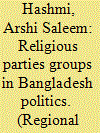

|
|
|
| 13 |
ID:
122878
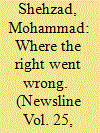

|
|
|
| 14 |
ID:
156206


|
|
|